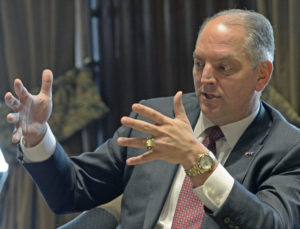John Bel Edwards was elected governor of Louisiana in 2016. He previously served as the Minority Leader of the Louisiana House of Representatives. Edwards identifies as a conservative Democrat who is pro-life and pro-Second Amendment. His approval rating of 55 percent makes him one of the most-liked governors in the United States.
Harvard Political Review: Do you believe your election as a Democratic governor in a dark red state marks any shift in the values of Louisiana voters? If so, how does that reconcile with an almost 60 percent majority vote to get Donald Trump in the White House?
John Bel Edwards: No, I do not think it represents a shift. I am very much in the mainstream, and the voters in Louisiana embraced me because of that. They did not shift in order to become comfortable enough to vote for me. Democrats still have a registration edge over Republicans. The fastest-growing party by new registrations is the Independents or no-parties. I ran as a Democrat, obviously, but one who was acceptable to the vast majority of Louisiana. I am more of a traditional southern Democrat moderate on most issues. [Many] people would say that I am conservative on the Second Amendment issues and on the pro-life issue. Beyond that, I ran a fairly progressive platform. At the end of the day, my percentage of the vote and Trump’s percentage of the vote were very similar. I think I was 56 percent, and he was 58 percent.
HPR: In light of the Congressional baseball shooting, which resulted in the injury of Majority Whip Steve Scalise, do your more conservative views on gun control stand? How do you plan to prevent tragedies such as these in Louisiana’s future?
JBE: Those gun incidents are awful. I do not know of anything that could have been done to prevent the shooting – in terms of how the individual came to own and possess the gun – both as it relates to the shooting of Steve Scalise and others in Virginia, or the shooting more recently in Las Vegas. I do not know that either had been diagnosed with a mental illness or something like that, which would have prevented them from acquiring guns or flag them.
I am very strong in my support of the Second Amendment. I do believe, based on what happened in Las Vegas, that bump stocks need to be looked at. There is a reason that we do not have fully automatic weapons in the hands of people. While it does not technically make a semi-automatic rifle fully automatic, it is close enough that it needs to be examined. Whether the Bureau of Alcohol, Tobacco, Firearms [and Explosives] does it administratively through rule-making or whether Congress does it, they need to take a look at that and put some restrictions on it. I have always supported making sure that we have a meaningful background check: where there are obvious holes, they [should be] closed. Beyond that, I do not see us moving in the direction of more restrictions on an individual’s ability to exercise their rights to the Second Amendment.
HPR: How do you see Louisiana reacting to climate change through policy since the state is so heavily reliant on the fossil fuel industry?
JBE: We are. But part of that is good news, too, because we are very rich in natural gas. Even though it is a hydrocarbon, it is cleaner burning and less environmentally dangerous to access and transport relative to coal. You are seeing some oil and gas companies pushing back against what President Trump and Secretary Perry are trying to do right now to promote coal. They have already made their investment in gas because they know it is better for the environment, cheaper to produce, cleaner to burn, and cheaper to transport. Because Louisiana is a natural gas state, it positions us well. We have $90 billion in projects announced in Louisiana right now, some of them are underway, and the vast majority is directly related to the fact that we are strategically positioned where we are with the Mississippi River and the Gulf Coast. We have pipelines in the ground. We have our fair share of natural gas, but with the pipelines, the gas can come from anywhere. When you talk about, for example, exporting liquefied natural gas, there is only one state in the nation doing that today, and that is Louisiana.
Also, the chemical manufacturing sector of our economy is huge, and they use natural gas as a feedstock and as a source of power. Louisiana is positioned very well – even without climate change – when you look at natural gas because there are so many places in the world looking for natural gas, and they would much rather get it from the United States than from Russia. You have big parts of Europe that are looking to contract for natural gas, and they are in the United States trying to do that. And you have countries like China that recently decided that they are going to move away from their reliance on coal, and they have made it easier to import natural gas, even from the United States. There is a very bright future there. And even the demand for oil is supposed to increase by twenty percent over the next couple of decades.
Climate change is real; I do not deny it. Human conduct plays some role in it, but we have to make strategic decisions. When we do that, it benefits the state of Louisiana, to the extent that we are promoting natural gas, especially.
Image Source: Flickr/Casino Connection
This interview has been edited and condensed.
